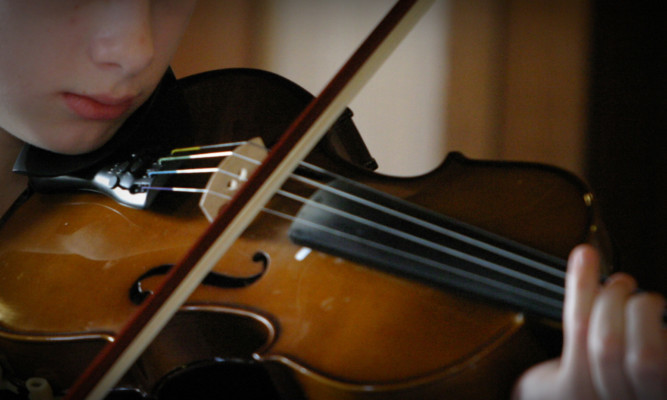Angus schools’ music tuition is set to be slashed by more than a third as part of a council cost-cutting programme.
The move would see the number of music teachers in the area’s 61 schools cut to just 11 from a current full-time equivalent of more than 18.
If councillors agree to the plan, which officials say will save the authority almost £200,000 a year, piano and guitar teaching will be dropped completely.
The proposals have been met with dismay by a leading figure in the local orchestral music scene who fears the cuts could lead to “elitism” as pupils lose the opportunity to take up an instrument at school.
Tayside Symphony Orchestra conductor and former principal music teacher Ron Walker said he was concerned where the planned cuts would lead for both children and teachers in terms of developing talent and providing “wonderful” opportunities through music.
Angus children and learning committee councillors will be asked to approve the redesign of the authority’s Instrumental Music Service (IMS) which would lead to the 36% reduction in an area of teaching currently taken up by almost one in 10 Angus youngsters.
Following a £24,000 efficiency saving last year, a service review group was tasked with analysing the IMS and has delivered the set of recommendations which will see the equivalent of 12 part-time music teachers axed.
Council head of schools and learning Pauline Stephen’s report reveals that in the 2013/14 school session some 1,188 pupils 9% of Angus schoolchildren took music lessons.
A standard charge of £201 applies for each music pupil, along with a £30 charge for instrument hire.
The report adds: “The instrumental service covers all eight secondary schools and as far as practical all 53 primary schools depending on up-take in rural areas.
“In general, strings and piano lessons begin in P4, brass, woodwind, pipes and guitar lessons in P5 and percussion in S1.
“Children can be taught in groups of up to six in early stages but more advanced pupils can receive one-to-one, especially those seeking places at conservatoire or university.
“Around 300 pupils take part in IMS bands and orchestras programme and between 50 and 60 attend ‘Concert-in-a-day’ band weekends. Sixty pupils attend the Angus Youth Orchestra for which there is a fee of £35 and is self-funding.”
Across the authority area, the IMS generated £150,000 of income for the council last year, offsetting an operating cost of more than £700,000. The new plan would bring in around £91,000 against a reduced operating cost of £515,500.
Councillors will be told that consultation took place with a variety of stakeholders in an effort to meet the challenge of operating the service effectively across Angus.
The report also states that learning a musical instrument is “perceived as a benefit and a force for good in children’s lives”.
The review group looked at options of operating with seven, nine and 11 full-time equivalent music teachers and said the plan does not include guitar because “it can be accessed cheaply outwith school” and at college evening classes.
Mr Walker said he considered the prospect of the cuts with “dismay”.
“The one thing that it would lead me to think is where now?” he said.
Through his pivotal role since the formation of the TSO, he said he had seen a number of talented young Angus musicians develop, and enjoyed “marvellous” schools’ concerts.
“Does this mean now that the less able kids may not be as well catered for if the same musical opportunities do not exist? That would not be a nice situation and could be a bit elitist,” he said. “I would imagine that down the years youngsters would give their eye teeth to be able to pick up an instrument and be taught by a professional person.
“A lot of youngsters, particularly in rural areas, saw their older brothers and sisters coming through the ranks of playing instruments, being in choirs and performing in shows and they followed them in that. I don’t see that happening as much and there will now be some kids, not long started with an instrument, who are going to be told that it’s the end.
“My reaction to this is one of dismay. I am fearful for the future and I have to ask again, where now?”
